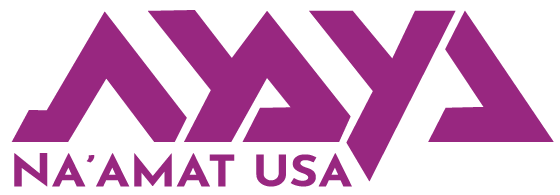Each year, NA’AMAT awards financial assistance to about 200 academically gifted Israeli women enabling them to follow their dreams and pursue bachelor’s and master’s degrees in challenging programs of study. Below you’ll hear about the inspiring work our scholarship recipients from years past have undertaken.
“Electric Properties of Self-Assembled Peptide Nanostructures towards their Implementation in Electric Devices”
My name is Moran Amit and I am a Ph.D. student at the department of materials engineering at the Ben-Gurion University of the Negev in Israel, where I also studied towards my B.Sc. and M.Sc. degrees. This is my last year of Ph.D. studies under the supervision of Prof. Nurit Ashkenasy. Intending to pursue an academic career, I plan to continue my training as a postdoctoral fellow at the U.S.
My research focuses on the electric properties of peptides, which are short synthetic proteins, towards their possible implementation in various electric devices in the future. This research is motivated by charge transfer processes in nature, such as in the photosynthesis cycle and neuron signaling in the brain. The choice of peptides is mainly motivated by the relative easy synthesis of peptides and their chemical diversity, which together enable us to design and engineer a specific material “À la carte” with controlled properties. In addition, peptides possess the unique ability to spontaneously organize into nanometric structures (i.e. billionths of a meter in size), a process known as self-assembly, which is of great relevance to the nanotechnology industry. The main goal of my research is to study the different mechanisms of electric charge transport through self-assembled peptide nanostructures and the factors affecting them.
Doctorate Student – Nomi Levenkron
My name is Nomi Levenkron and I am a doctorate student at the Faculty of Law at Tel Aviv University. I am 45 years old, the mother of three children, and live in a kibbutz in Israel’s periphery. After passing the Israel Bar examinations in 2000 and becoming an attorney, and until I began my doctorate studies in 2012, I devoted my professional life to addressing the field of prostitution and trafficking in women. I worked with the victims of trafficking in women as a member of staff in the Hotline for Migrant Workers. Through my work I met many hundreds of victims of trafficking in imprisonment facilities and shelters. I learned their stories, which later formed the basis for my academic work – courses and clinics I have run over the years, as well as my academic writing. I subsequently worked with other weakened populations, including Israeli women engaged in prostitution, girls suffering from anorexia, girls from families of collaborators, and so forth.
“The Marriage Market and Academic Education among Muslim Women in Israel”
Marian Tehawkho: I am a PhD student in the Department of Economics at Haifa University; I live with my husband and our three children in Kfar Kama, a Circassian village in the Lower Galilee. I would like to thank you for your generous scholarship, your support is important in promoting research in the field of gender and will contribute to strengthening the status of women in Israeli academy.
הקלד טקסט או כתובת אתר או תרגם מסמך.
Over the last decades, College attendance in most countries has increased faster among women than among men. A similar trend also exists in Israel for the Jewish population and even more so for Arabs: in 2011, the proportion of women among Arab students studying for a first degree was 65% compared to 53% in the Jewish population. But while in most countries this trend is also translated to a corresponding increase in labor force participation rates, among Arab women and mainly Muslims is Israel, the reality is a little different. In particular, the participation rate among Jewish women has increased during the last two decades at all levels of education, whereas among Muslim women with post-secondary education labor force participation is volatile with a declining trend.
Research summary – Tali Ilovitsh
First, it is a great honor for me to receive the Idelson Foundation Fellowship for Ph.D. students, Naamat. I’m a Ph.D. student in the faculty of electrical engineering at Bar Ilan University, Ramat-Gan, Israel, in Prof. Zeev Zalvesky’s lab. I have an M.S. and B.S. with honors in Electrical Engineering from BIU in the direct course. As a mother to a one year old baby girl, this fellowship will be of an immense assistance to us. I intend to do a postdoc abroad and return as a researcher and hope to become a role model to many young women, who consider following their talents and aspirations in academia, in a field that is traditionally dominated by men.
My research focuses on two main fields. The first is super resolved microscopy that is aimed for pushing the limits of nanometer-scale optical microscopy techniques with the goal of studying molecular-scale biological systems, thus providing valuable insights into cellular processes.
The second aspect of the my research is to use optical image processing in order to perform mathematical transforms for pattern recognition that is widely used in biomedical applications like computer tomography. Conventionally it is done digitally using computers and therefore is limited by the processor’s speed, while implementing it optically will increase processing speed immensely. One such of a transform is the radon transform, which we were able to successfully implement it using a novel optical system in a single frame with an optical system that is simple, fast and accurate.





